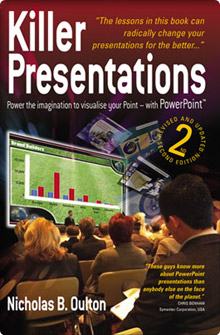
NLP: Nothing Like Properscience!
About every other course somebody asks me about how Visual Cognitive Dissonance (VCD) sits with Neuro Linguistic Programming (NLP). My tongue-in-cheek response is that VCD is based on science and, as far as I am aware, is consistent with all the major religions, and so almost certainly consistent with the minor ones such as NLP.
Why do I compare NLP to a religion? Looking at the research, it’s at best inconclusive and at worst labeled as pseudoscience. Linguistics isn’t my main calling, but I’m pretty convinced that the fundamental tenants of NLP may be suspect. In fact I love the following quote from the founders of NLP:
We have no idea about the “real” nature of things, and we’re not particularly interested in what’s “true”. The function of modelling is to arrive at descriptions which are useful
Bandler, R. and Grinder, J. (1979), Frogs into Princes: Neuro-linguistic Programming, Moab, Utah: Real People Press
I also love the publisher! Moab, Utah…makes me think of the brilliant musical for the non-pious, “The Book of Mormon” – also beautifully relevant for this observation.
An act of faith
NLP requires an act of faith, and most believers aren’t particularly interested in a debate about whether their belief system is true or not. And, some may be offended by people like me saying rude things about their belief system. Since I have some friends who are NLP practitioners, I am careful not to offend these people by blaspheming. I do, however, wonder what NLP hell looks, sounds or feels like…
Like all belief systems that have bright, intelligent followers, NLP has to be consistent with empirical evidence. It may fail the scientific method but much of the surrounding advice is basically sound. “See the world from the others point of view” is a pretty much a fundamental NLP concept, but I’m sure its one of Coveys 7 habits (Think Win Win) and it’s pretty much in line with Phase 1 of Killer Presentations, which makes it just plain common sense.
If you want to believe that modifying your language can help you communicate effectively, then I’m in agreement with you—if you need to call that NLP, well each to his own. I’m pretty sure that most religions include some degree of practical self-help. None of this should be thrown out just because the basic tenant seems unlikely.
Most courses I have seen based on NLP would be just as valuable without validating the content with the NLP philosophy. Given the lack of evidence, I would drop it and stick to actual science. There is a remarkable amount of research that can inform most of what I have seen passed off as NLP.
So if you’re interested in this debate, take a look at some NLP literature and ask yourself how similar it sounds and feels like an advertisement for a religion. I would love to hear your thoughts on this one. If you have observations, I’d love to read and respond to them. If you have statements of belief, I really don’t want to offend anyone and probably won’t respond.

Comments
There are potential paralels with the dismantling of religion by Dawkins in God Delusion that jumped out at me when I read this entry. The many issues with NLP begin even with their starting point: “We have a brain, but no manual” being the gist of what practioniers claim, so therefore NLP will teach you to programme the brain, this seems to be dervied heavily upon the misconception that because one person is able to perform a task, that everyone else can be “programmed” to achieve it too. This is grounded according to proponents of NLP in an understanding of the brain, once which is clearly an fundamentally flawed and outdated understanding of the brain and the roll of neurons and transmitters. The grand claims made by those providing NLP training (so no vested interest there then) are not supported by the cognitive literature on thinking or perception, or indeed any of the work that I’m aware of from the neuroscientists. VCD on the other hand is heavily driven by a theoretical understanding of a peer-reviewed and established psychological literature (although not fully tested yet in the VCD guise).
The von Bergen paper is, I believe, the classic, cited paper on the area. I’m sure that there was also a meta-analysis of the NLP literature in the late 80s or early90s that was (rightly) dismissive of the approach. The links between representations and linguistic expression will be virtually non-existant and I would bet a pound to a penny that the link between eye movement and either representation or linquigistic expression will be even less.
I just had a quick play with Google Scholar and I imagine that
Beyerstein, B. L. (1990) Brainscams: Neuromythologies of the New Age. Intl. J. of Mental Health. Special issue on quackery 19(3):27-36.
dismantles NLP quite effectively and that
Elich, M., Thompson, R. W., & Miller, L. (1985). Mental imagery as revealed by eye movements and spoken predicates: A test of neurolinguistic programming. Journal of Counseling Psychology, 32(4), 622-625.
would be sufficient to remove any lingering doubts.
Interesting read, but unfortunatelly you’ve fallen into the usual trap of treating NLP as a single thing.
Do eye accessing cues work? Does the fast phobia cure? What about the language patterns generated by Milton Erickson and used by hypnotherapists around the world? Do ALL of these things need to be true for NLP to be valid or just one of them?
Personally, I don’t go on faith, I go on results, but I do agree with you up to a point on some of the literature – especially the ‘philosophy’ as you call it. My background is in computer science and the attractive thing about NLP to someone such as myself is how much of it is very logical and procedural. IT people like that kind of thing. Unfortunatelly NLP also attracts a lot of people who really are looking for some kind of belief system to hang their hat on, and NLP has none so they have to add their own dogma.
As to your line that NLP requires faith – I find that somewhat offensive – as someone who doesn’t ‘BELIEVE’ in NLP then perhaps you should try using the phobia cure and see if you get any results. If you haven’t tried any NLP techniques then for you to attack it without testing it yourself says something about your own prejudices.
Chris, thanks for taking the time to respond and please let me apologize for any offense. I am quite sure that some of the techniques used by NLP practitioners are useful. They may even work. That’s not the point. My point is that they aren’t proven.
You mentioned eye-assessing cues in your comment. Eye contact is a pretty hot topic for us presenters. In our training course we use an eye contact exercise to get delegates to experience how eye contact consumes cognitive load (time it takes to calculate 24 x 27 while maintaining eye contact versus a similar problem with eyes shut, now approximately 1000 delegates show mean times of 30 seconds and 10 seconds respectively).
We have concluded that breaking eye contact frees up cognitive load for other tasks. The implication for presenters is not to lock gazes with an audience member if you want them to think about what you said or asked.
So I am convinced that breaking eye contact signifies a need for available cognitive load, but does the direction of the eye movement tell us something about what that cognitive load is being used for (ala NLP)? We have no research that indicates so. Instead, we teach people to look for a break in eye contact as a significant indication of thought, and to rely on the whatever triggered the break in eye contact as an indicator of the subject of thought, and the next thing they say as an indicator of conclusions of this thought.
Some people believe that it tells them something else, and I am sure they act on it without causing any harm (its not like we are using it to determine truth or guilt for capital crimes) but it certainly isn’t without doubt and so relying on it and stating it as fact, calls into question the rest of the package of belief system.
As to the ‘NLP requires faith’ argument offence, I have to say the fact that you find it offensive does seem to me to prove my assertion that it is a belief system. For example had I said “I do not believe that the world is round,” I suspect nobody would be offended, they would just write me off as an idiot. So if challenging truth cannot cause offense, then offense caused by challenging as yet unproven argument seems to me to imply that these arguments are right to be challenged.
And as to trying the techniques myself, I may but I haven’t finished exploring sticking pins into dolls of bullet point users yet. Give me a chance!